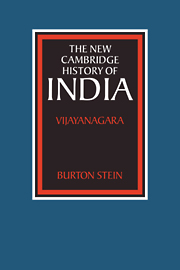Book contents
- Frontmatter
- 1 Introduction
- 2 The medieval past: continuity and disjunction
- 3 The city and the kingdom
- 4 Political economy and society: the sixteenth century
- 5 Imperial collapse and aftermath: 1542–1700
- 6 Conclusion
- Bibliographical essay
- Index
- THE NEW CAMBRIDGE HISTORY OF INDIA
- Frontispiece">
- Plate Section">
- References
- Frontmatter
- 1 Introduction
- 2 The medieval past: continuity and disjunction
- 3 The city and the kingdom
- 4 Political economy and society: the sixteenth century
- 5 Imperial collapse and aftermath: 1542–1700
- 6 Conclusion
- Bibliographical essay
- Index
- THE NEW CAMBRIDGE HISTORY OF INDIA
- Frontispiece">
- Plate Section">
- References
Summary
The Tondaiman chief received his title of raja from the last of the Vijayanagara kings, a strange and ironic conferment. For this was a symbolic entitling of a ‘little king’, already master of a small realm, by the last of a line of kings that had dominated the southern peninsula for three centuries, but who was master of little more than titles to be exchanged for military services he desperately needed merely to stay alive. But more linked the beleaguered Sri Ranga III and the Tondaiman raja than an entitlement, which hardly created the rajadom of Pudukkottai. The more significant connections were of another sort which had to do with what had become essential about the Vijayanagara kingdoms from the fifteenth century on.
The Vijayanagara epoch saw the transition of South Indian society from its medieval past to its modern future. During the time that the rayas were peninsular overlords and their capital the symbol of vast power and wealth, south Indian society was transformed in several important ways. Through most of the first dynasty, Vijayanagara kings were content to be conquerors whose digivajaya, or righteous conquests, of Tamil country left the ancient Cholas and Panyas in their sovereign places, except that they were reduced by their homage to Vijayanagara. Until the early sixteenth century, the latter were ritual sovereigns everywhere outside their Deccan heartland; apart from occasional plundering forays, they were content with the homage of distant lords.
- Type
- Chapter
- Information
- The New Cambridge History of IndiaVijayanagara, pp. 140 - 146Publisher: Cambridge University PressPrint publication year: 1990

